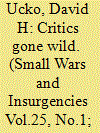| Srl | Item |
| 1 |
ID:
131470


|
|
|
|
|
| Publication |
2014.
|
| Summary/Abstract |
The Western interventions in Iraq and Afghanistan have produced a heated polemic concerning the merits and demerits of counterinsurgency - the operational approach underpinning both campaigns. The two books reviewed here provide a good summation of the arguments against counterinsurgency: it is not a strategy and will fail when mistaken as such; its theory does not make intervention and war significantly easier; and even the most successful counterinsurgency campaigns have been bloody, violent, and protracted. Yet as this review highlights, beyond these central points, criticism of counterinsurgency is too often off the mark in its approach and totalizing in its pretentions. There is much to criticize and an urgent need to learn from past campaigns, yet bold claims and broad generalizations can mislead rather than enlighten. The analysis is particularly unhelpful when the definition of the central issue at hand - counterinsurgency - is being unwittingly or deliberately distorted. In the end, these two books form a poor basis for the debate that must now take place, because they are too ideological in tone, too undisciplined in approach, and therefore too unqualified in what they finally say.
|
|
|
|
|
|
|
|
|
|
|
|
|
|
|
|
| 2 |
ID:
164914


|
|
|
|
|
| Summary/Abstract |
This article sets out to explain how the Sadrist movement targeted ex-combatant communities in their communication strategy to mobilize the Mahdi Army. The Mahdi Army was established by the Sadrist movement under the guidance of Muqtada al-Sadr in 2003. This article proposes that post-2003 Iraq experienced a demobilisation crisis, fostering segments of ex-combatant communities whose ingrained repertoires were prone to paramilitarisation. Contrary to many other paramilitary organisations around the world, the Mahdi Army was formalized through a bottom-up process by non-state actors, and only at a later stage was the Mahdi Army explicitly co-opted by the Iraqi state in 2005. The overarching argument of this article is that social networks with specific assets, skills and history are more vulnerable to paramilitarisation by entrepreneurs of violence than various other networks.
|
|
|
|
|
|
|
|
|
|
|
|
|
|
|
|